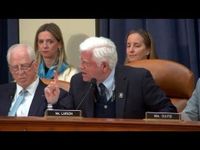In a heated exchange that is making waves across political platforms, Congressman John Larson (D-CT) raised a piercing question: "Where is Elon Musk?" This query came as an emotional outburst amid discussions at the U.S. House Ways and Means Committee on March 12, 2025, where Larson vociferously criticized not only Musk but also the actions of President Donald Trump’s administration concerning the future of Social Security.
Larson’s remarks were sparked by Musk’s absence during the hearing, which was convened to address the ongoing dismantling of Social Security, an effort Larson attributes directly to Musk's influence and the broader agenda of the Trump administration. "If Musk is so great, if these plans and all the fraud and abuse that he found are so eminent, why isn't he here explaining it?" Larson demanded, implying that Musk’s lack of accountability is indicative of a troubling agenda.
The congressman, who has represented Connecticut since 1998, is known for his advocacy for Social Security recipients. In his speech, he painted a dire picture, arguing that Musk's purported efforts to overhaul the agency are a ruse aimed at privatization. "You know why, 'cause he's out to privatize Social Security," Larson asserted passionately. This comment highlights a growing fear among many Democrats that Musk sees Social Security as a ‘Ponzi scheme’ and is positioning himself to capitalize financially from its dismantlement.
Alongside these fierce criticisms, it’s important to note that the federal court recently intervened in a related matter. A ruling by Judge Theodore Chuang halted efforts by the Department of Government Efficiency (DOGE)—a body led by Musk aimed at cutting government expenditures—to eliminate the U.S. Agency for International Development (USAID). The judge concluded that Musk has "firm control" over DOGE and dismissed the Trump administration's claims that Musk was simply an advisor and acted outside the purview of a federal official. In his judgment, Chuang remarked that Musk's sensational claim of having "fed USAID into the wood chipper" demonstrated a concerning level of personal involvement.
The court’s intervention not only signals a setback for the Trump administration’s strategy to restructure foreign aid but also directly challenges Musk's role as an unconfirmed advisor wielding significant influence over federal operations. Observers predict that these legal battles could set significant precedents regarding executive authority and the limits of administrative overreach.
In highlighting the precarious fate of Social Security, Larson referred to the larger issues at play, questioning how a billionaire like Musk could operate above the law. "I’m sure he is a genius and a very credible person, due to the money he’s amassed," Larson noted ironically, suggesting that wealth should not exempt one from accountability. His confrontation of the committee further illustrated the rift in Congress, where the Republican-majority dismissed calls from Democrats to investigate Musk's activities.
The refusal to pursue an inquiry into Musk’s actions, particularly regarding his influence over Social Security and USAID, has left many questioning both the motivations and the integrity of those currently in power. Larson’s emotional appeal and urgent questioning underscore a mounting sense of frustration among Democrats who view these developments as a threat not only to essential services like Social Security but also to the fundamental principles of governance.
As the situation unfolds, the legal ramifications continue to loom large. The court’s decision not only stops cuts and restores crucial access for those working at USAID but also raises poignant questions about the future of government programs—particularly as the administration prepares an appeal that could escalate the matter to higher courts.
Meanwhile, the public’s attention remains intensely focused on Musk—a figure whose declared ambitions to eradicate "superfluous state expenditures" have increasingly come under scrutiny. Larson’s emotional appeal firmly places a spotlight not just on Musk, but on the broader issue of corporate influence in governmental functions.
As this saga continues to develop, the impact on American society remains to be seen. If legislators fail to ensure accountability from figures like Musk, could Social Security and other vital services truly be at risk? Larson’s confrontation is likely just the beginning of a deeper inquiry into power dynamics in Washington.
The challenges of governmental oversight and the protection of vital public services are especially pressing now, leaving many to wonder: what will be the legacy of this administration in relation to Social Security?






